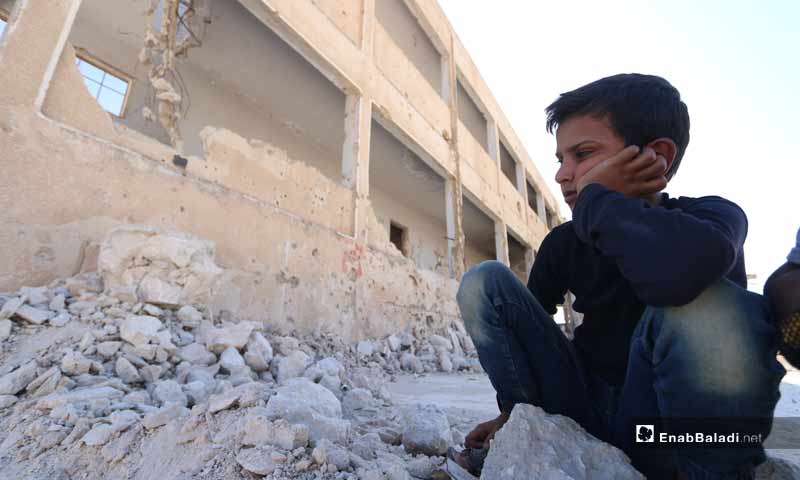



For three years now, educational authorities of Idlib have not been able to provide students with new school textbooks. The shortage of textbooks has reached a critical point, threatening the educational process amid constant attrition that schools suffer from due to the shelling and destruction.
Idlib educational superintendent, Abdullah al-Abssi, told Enab Baladi, “we have created a generation unable to think about the simplest issues, as a result of using old textbooks with exercises solved by older students.”
Idlib had the resources to cover mo more than 30% of the needs of students even before the latest wave of displacement, which was described as the largest during the years of the Syrian conflict. As a result of the military campaign waged by the Syrian regime and its Russian ally since February, more than one million people left the southern Idlib countryside and the northern Hama countryside.
Al-Abssi highlighted that the responsible bodies for education and supporting agencies could not provide any new textbooks in the past three years. Additionally, the educational institutions face increasing pressure to accommodate and deliver services to the residents and the displaced.
Students at the first stages of education need to be provided with new textbooks every year because “students do their assignments in the books. If the book is used for the second time or more by students, this means that we are destroying their critical thinking because answers have already been written on the books by other students,” al-Abssi explained. “Students in the higher educational stages, are in need for the books to have detailed information, graphics, maps and others.”
Contingency plans
The head of the Department of Publications and Textbooks at the Directorate of Education in Idlib, Anwar al-Said, said in an interview with Enab Baladi, “everyone knows the importance of textbooks and their role in schools,” highlighting their importance in developing students’ learning skills and unifying concepts and instilling values. The directorate has boycotted the Syrian regime’s textbooks for being ‘intellectually and pedagogically poisonous’ according to al-Said. “The textbooks of the Syrian regime glorify the head of the Syrian regime and presents him as the peacemaker even though he destroys, kills and displaces students. The president of the Syrian regime ravaged the educational process,” al-Said said.
Al-Said pointed out that the textbooks adopted by the Syrian regime cause “corruption” through spreading historical and geographical misconceptions. Therefore, the area’s controlled by the Syrian opposition adopted a modified curricula for their schools.
This year, the directorate developed an emergency plan that called for recycled textbooks to be used in their schools. However, this only covers 10-20% of the needs, according to al-Said. Al-Said warned against the negative effects of the absence of textbooks in each class, which “affects the educational level of the students, their level of thinking, values and educational concepts.”
Role of civil society
Al-Abssi highlighted that the only solutions so far to compensate for the shortage of textbooks are for teachers to summarize the lessons on the blackboard. He also noted that promises made by the Interim Government to secure textbooks have not materialized yet.
The directorate called on civil society organizations and institutions to help in obtaining textbooks. However, “responses from international organisations and the international community has been weak,” according to al-Said. The directorate aims to facilitate these efforts by offering digital copies of the all the needed textbooks to international organizations.
Al-Said indicated that the military campaign in the area has affected more than 100 schools in the southern educational sector in Idlib and led to the displacement of more than 50,000 students to northern Idlib. The military campaign also caused the loss of large numbers of recycled books in the many abandoned schools in the south. “These textbooks are now inaccessible due to the continued shelling that is targeting many schools in southern Idlib and educational complexes in the towns of Maarra, Kfarnabel, Ariha and Jisr al-Shughour,” according to al-Said.
Al-Said added that the total number of students in need of textbooks in Idlib is about 450,000 students, from the first education stage at school to the baccalaureate stage. The Education Directorate does not have new textbooks to distribute them to the students. The provision of these textbooks has to be now the “duty of the civil society organizations and institutions.”
if you think the article contain wrong information or you have additional details Send Correction